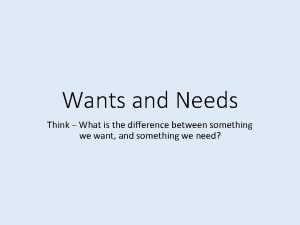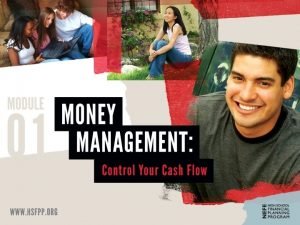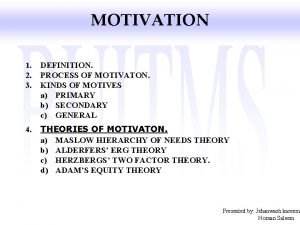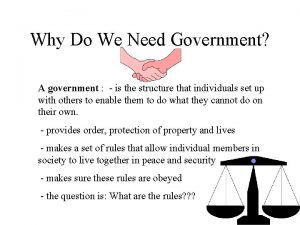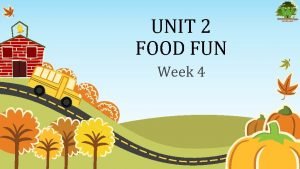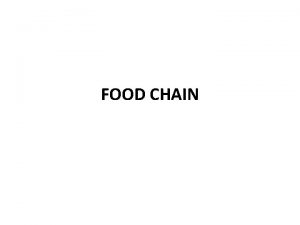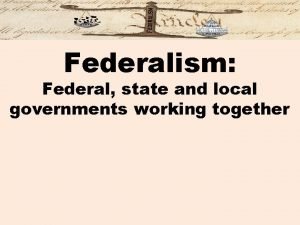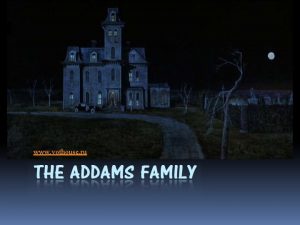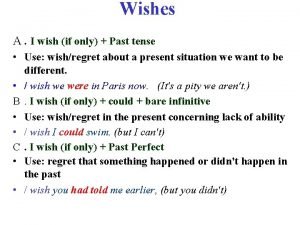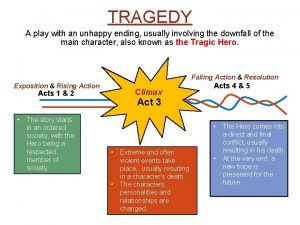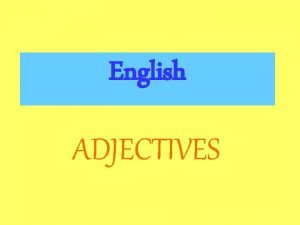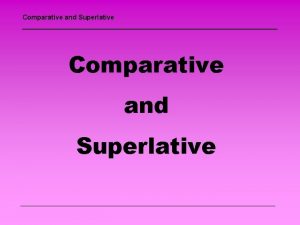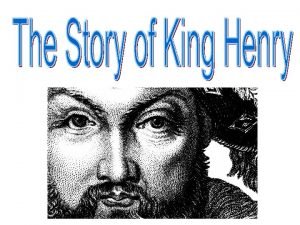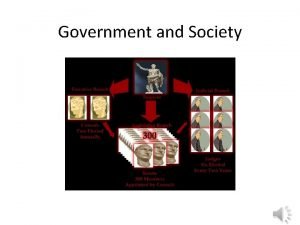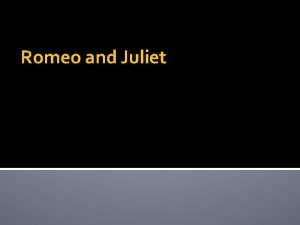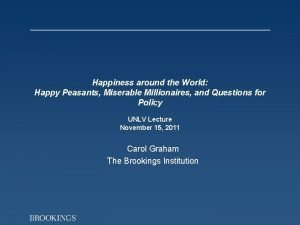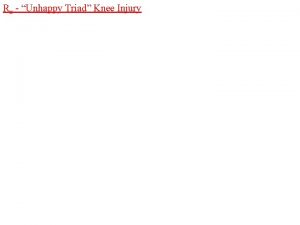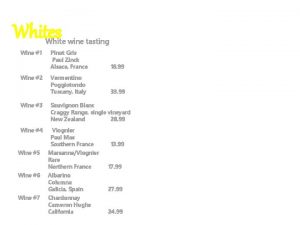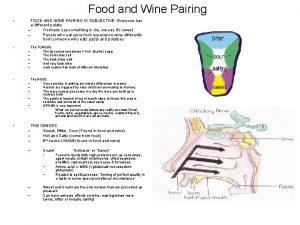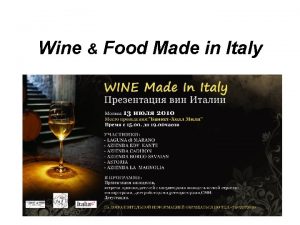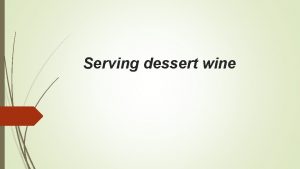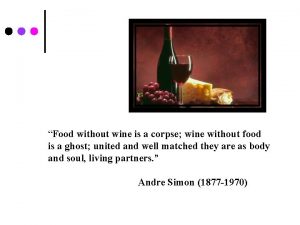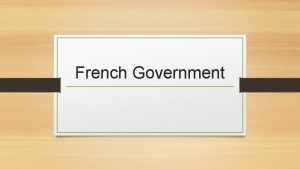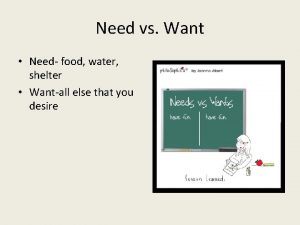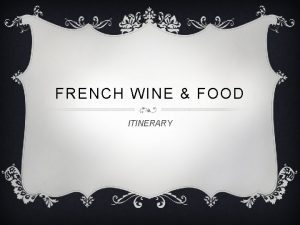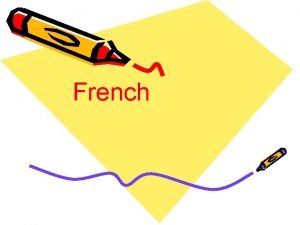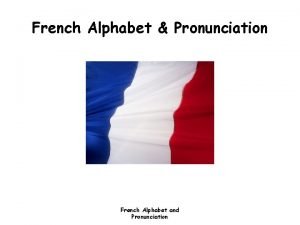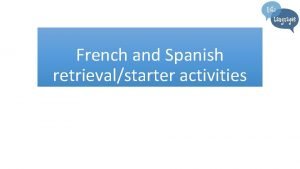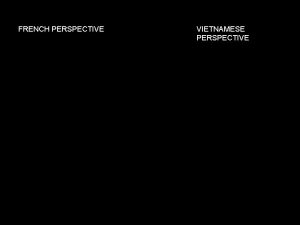Unhappy French Want Food New Government Need Wine






















- Slides: 22

Unhappy French Want Food New Government Need Wine No Clean Water French Revolution MORE Bread

France 1789


Part 1 Vocabulary: Old Regime • Old Regime – old Class System social and political system of France that had been around for centuries • Peasants – lowest class in the Old Regime Class System; rural poor farmers; make up 80% of the population • Bourgeoisie – wealthy middle class • Estates General – the legislative assembly that is divided into 3 parts called estates; Each Estate is made up of a class of people • First Estate – made up of Clergy 1% of population • Second Estate – made up of nobility 2% of population • Third Estate – everybody else 97% of population

The Old Regime or Ancien Regime • Old Regime was the social order & political system in France that had been around for years. • Under the Old Regime: ruled • Under the Old Regime: people were divided into classes: 1. The common man paid all the taxes 2. The nobility & clergy [church people] did not pay many taxes & owned the property 3. The MONARCH paid no taxes; lived off the tax money paid to the government

Government under the Old Regime Estates General: each estate has only 1 vote • FIRST Estate 1% – The Church or clergymen • SECOND Estate 2% – Nobility • Third Estate 97% • Everyone else – commoners – Peasants – wealthy bourgeoisie [middle class] – merchants ? ? ? That’s it we all have one vote? ?

Under the Old Regime, the King ruled with Divine Right from GOD King Louis 14 th Rem em Me ber ? King Louis 16 th of France Great Grandson of Louis 14 th

King Louis XVI 1754 -1793 • After the death of his grandfather, Louis XV, 20 year old Louis was crowned Louie XVI in 1774. He ruled until 1792 when the people ended the monarchy. He often appeared unfeeling and gruff. He was insecure and disliked being King. When one of his ministers resigned, he was heard to remark, n "Why can't I resign too? " n

So what does the King do? ? ? Appointed “tyrants” to govern the districts. N O D N E SP O T EY xuries N O X M CE & lu A T S TAKE HIS PALA Appointed favorites to collect his taxes. Put taxes on whatever and decided how to spend the money Imprisoned anyone at any time for any reason. Controlled the military. Made decisions on war. Appointed all judges. Made all laws.

Bankrupt: French Royalty Spends too much $$$ The Monarchy adopts deficit spending or spending more money than is in the bank The Queen’s bedroom • The royal family lived in luxury at the Palace of Versailles. Hall of Mirrors

Finally in 1778 she gave birth to a princess, followed in 1781 by a son. Marie Antoinette • Marie Antoinette married Louis in 1770 when she was 14 and he was 15. • To. She she makewas up 18 for when the lack ofbecame affection queen 18 in 1774; on as from her husband andearly the endless Queen, sheher was flighty, the selfcriticism from mother, centered and irresponsible. Empress Maria Theresa, Marie • Her shy husband would not Antoinette began to spend more: on consummate their marriage for 7 gambling with and horseyears to hercards dismay. betting; on fashion with trips to the to new clothes-makers for • city. She was unpopular and had few dresses, shoes, and make-up friends because she was and an hair. Austrian. Marie Antoinette, before her marriage: age 13

Old Regime Economic System • Rural farmers, Peasants, made up 80% of the French population – they rented their lands from nobles – they had to pay taxes to the nobles for the right to use the land – Peasants paid most of the taxes – Poor harvests meant poor peasants & no tax payments

Poor Peasants France had a population of 26 million in the 1780 s 23 million were Peasants who worked and lived on the land About 40% of that land belonged to Peasants All Peasants had to use the lord’s flour mill, bread oven and wine press & were not allowed to have their own • All Peasants had to let the lord hunt freely on their land • All Peasants had to pay – Feudal dues or rents to the lord of the manor – Tithes or a tax to the church. • •

Urban Dwellers • 20% of French population lived in urban areas • Only 8 cities had a population over 50, 000 • These cities were had workshop & industry with seasonal – or permanent – work. • Death rates were high among city poor. 2 million were middle class Bourgeoisie who made fortunes in business or trade; invested in property & education for their children, who became professionals

The Three Estates Estate First Rules • About 130, 000 • Collected the tithe [10% church dues] • Censored the press • Controlled education • Kept legal records of births, deaths, marriages, etc. • Catholic was the state religion • Owned 20% to 30% of the land • Paid no taxes • Subject to Church law not civil law • Obligated to assist the poor • Support the monarchy & Old Regime • Paid no taxes • Subject to civil law • Support the monarchy & Old Regime • Nobles • 2% of the total population of France • Collected taxes in the form of dues • Charged feudal tax [10%] to those who worked the land • Monopolized military and state appointments • Owned 20% to 30% of the land • About 25 million • None • Paid 100% of the taxes • Subject to civil law • Paid Tithe (Church dues) • High-ranking clergy, chuch men parish priests • 1% of the total population in France Second Third Burdens • About 210, 000 • Everyone else: wealthy businessmen; bourgeoisie [middle class], artisans, city workers, merchants, peasants, etc. , along with many parish priests Paid all taxes: • tax on goods brought into cities) • road work tax • voting tax • income tax • salt tax: Gabelle • land tax: Taille • Dues to use lord of the manor’s winepress, bakery oven, mill, etc.

Taxes, taxes and more taxes We pay while the rich play Taille: Land Tax Salt Tax

France under the Old Regime. Point out which man belongs to: the First Estate? The Second Estate? The Third Estate? What does the ROCK symbolize?

Political Cartoon of Three Estates 1789 Political Cartoon of the before the French Revolution - WHAT DO YOU SEE? - WHAT DO YOU THINK YOU SEE? • What estate does the man on the bottom represent? • Which estate does man in a blue uniform represent? • Which estate does the man with the white wig and feathered hat represent? What does this cartoon tell you about the cartoonist’s point of view of the Estates General?

Review: Short Term Causes of the French Revolution: France goes Bankrupt: 1787 to 1789 • Wars deplete government funds: – – War of Austrian Succession 1 billion livres French & Indian War [1756 -1763] = 1. 8 billion livres American Revolution [1776 -1781] = 1. 3 billion livres Over 4 billion livres in debt & none was paid back • Deficit spending – the government spends more money than it takes in [$40 billion = national debt] • Privileged classes refuse to be taxed yet spent lavishly ADD TO THAT: • Bad storms, drought = poor harvests in 2 years = food shortages; famine in countryside; starvation in cities – underprivileged classes cannot pay taxes …they have no income, no food

Short-term Causes of the Revolution Bankruptcy 1789 Great Fear Estates-General • Caused by deficit spending • Taxes for the nobility voted down in 1787 • Famine for 2 years • Hungry poor fear nobles who wanted more privileges • Peasants attack nobles’ homes and burn IOUs for feudal dues • Finally in May 1789 Louis 16 th is forced to call Estates-General to stop bankruptcy • All Three Estates will attend • Estates-General had not met in 175 years, since 1614 under the great, grandfather of Louis 16 th

Timeline of Economic Woes in France • 1787 – 1788: bad harvests due to drought caused food shortages and rising food prices • 1788 – 1789: slowdown in manufacturing and in silk and wine production caused a spike in urban unemployment • 1788: population of poor grows to 1/3 of the total population of France • 1788: government bankrupt from deficit spending…the government spends more than it takes in. No one would lend it money. • 1789: France could not raise new taxes, nor collect any outstanding ones. • 1789: To raise taxes, the King was forced to call a meeting of the Estates General which had not met in 175 years [since 1614 under Louis XIII]

Causes: Review • What enlightened ideas would have appealed to the Third Estate in France? • Why would the American Revolution have had an effect on the French Revolution? • Why didn’t absolutism work in France in 1789? • How did France’s tax system cause the revolution? • What other factors added to the causes of the French Revolution? • Could this revolution have been avoided? Explain your answer.
 Needs and wants examples
Needs and wants examples Difference between need and want
Difference between need and want Want-satisfaction chain
Want-satisfaction chain New oil and new wineskin
New oil and new wineskin Valentin bianchi new age
Valentin bianchi new age Need of constitution
Need of constitution Unit 2 food food food
Unit 2 food food food Eltonian pyramid
Eltonian pyramid National powers
National powers Unhappy darling?
Unhappy darling? I wish + tense
I wish + tense A play dealing with an unhappy ending
A play dealing with an unhappy ending Negative prefixes examples
Negative prefixes examples Fat comparative superlative
Fat comparative superlative A wondering mind is an unhappy mind
A wondering mind is an unhappy mind Many people are unhappy with
Many people are unhappy with The mice very unhappy story
The mice very unhappy story King henry chocolate milk story
King henry chocolate milk story Government
Government The greatest source of ideas for new products is
The greatest source of ideas for new products is Diction in romeo and juliet
Diction in romeo and juliet Romeo and juliet jeopardy
Romeo and juliet jeopardy Unhappy millionaires
Unhappy millionaires
